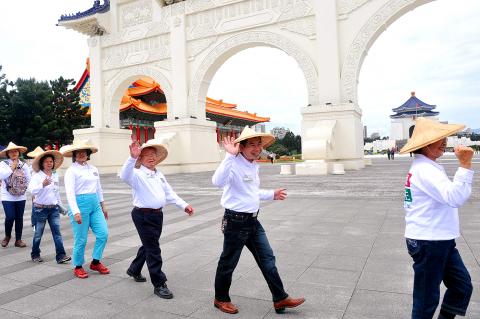People Masters, a civic group advocating amendments to the Referendum Act (公民投票法), yesterday launched a campaign urging legislative candidates to promise to push for revisions to the law if elected.
Wearing traditional hats made of bamboo leaves and T-shirts with the words “People are Masters,” about 100 volunteers from the organization gathered at Liberty Square in Taipei to go through a brief training session before departing for a march around the city to hand out fliers.
“Although we passed the Referendum Act in 2003, it’s actually a law that blocks citizens from practicing their right to referendums,” People Masters executive committee member Cheng Li-chun (鄭麗君) said.

Photo: Chien Jung-fong, Taipei Times
Because of the high threshold needed to endorse a referendum proposal and because a proposal must be reviewed by the Referendum Review Committee, “the Referendum Act … has become an obstacle to direct democracy,” she said.
In the four years since President Ma Ying-jeou (馬英九) took office, the government has blocked all referendum proposals on nationwide issues, Cheng said.
“The Chinese Nationalist Party [KMT], which has an absolute majority [in the legislature] and Ma should be held responsible for not having done anything in the past four years to revise the law,” Cheng said, adding that the goal of their campaign was to tell legislative candidates “what the people want.”
Besides asking candidates to promise to push for amendments, they also handed out postcards to voters so they could deliver the message to candidates in their electoral districts that they want a revision to the act.
The group is also calling for the referendum proposal threshold to be lowered, that the Referendum Review Committee be abolished and that the clause in the law that requires an absolute majority for a referendum proposal to pass be deleted.
Democratic Progressive Party (DPP) legislative candidate Lo Chih-cheng (羅致政), who is running for the seventh electoral district, which covers part of New Taipei City’s (新北市) Banciao District (板橋), and Pasuya Yao (姚文智), who is running in Taipei’s Shihlin (士林) and Datong (大同) districts, as well as Cheng herself, who is on the DPP’s at-large list, have promised to push for amending the law if elected.
Two other DPP candidates, Chien Yu-yen (簡余晏) for Taipei’s Zhongshan (中山) and Songshan (松山) districts and Yen Sheng-kuan (顏聖冠) for Taipei’s Zhongzheng (中正) and Wanhua (萬華) districts, have also promised to do so.

Taiwan is stepping up plans to create self-sufficient supply chains for combat drones and increase foreign orders from the US to counter China’s numerical superiority, a defense official said on Saturday. Commenting on condition of anonymity, the official said the nation’s armed forces are in agreement with US Admiral Samuel Paparo’s assessment that Taiwan’s military must be prepared to turn the nation’s waters into a “hellscape” for the Chinese People’s Liberation Army (PLA). Paparo, the commander of the US Indo-Pacific Command, reiterated the concept during a Congressional hearing in Washington on Wednesday. He first coined the term in a security conference last

Prosecutors today declined to say who was questioned regarding alleged forgery on petitions to recall Democratic Progressive Party (DPP) legislators, after Chinese-language media earlier reported that members of the Chinese Nationalist Party (KMT) Youth League were brought in for questioning. The Ministry of Justice Investigation Bureau confirmed that two people had been questioned, but did not disclose any further information about the ongoing investigation. KMT Youth League members Lee Hsiao-liang (李孝亮) and Liu Szu-yin (劉思吟) — who are leading the effort to recall DPP caucus chief executive Rosalia Wu (吳思瑤) and Legislator Wu Pei-yi (吳沛憶) — both posted on Facebook saying: “I

The Ministry of Economic Affairs has fined Taobao NT$1.2 million (US$36,912) for advertisements that exceed its approved business scope, requiring the Chinese e-commerce platform to make corrections in the first half of this year or its license may be revoked. Lawmakers have called for stricter enforcement of Chinese e-commerce platforms and measures to prevent China from laundering its goods through Taiwan in response to US President Donald Trump’s heavy tariffs on China. The Legislative Yuan’s Finance Committee met today to discuss policies to prevent China from dumping goods in Taiwan, inviting government agencies to report. Democratic Progressive Party Legislator Kuo Kuo-wen (郭國文) said

The Ministry of Economic Affairs has fined Taobao NT$1.2 million (US$36,900) for advertisements that exceeded its approved business scope and ordered the Chinese e-commerce platform to make corrections in the first half of this year or its license would be revoked. Lawmakers have called for stricter supervision of Chinese e-commerce platforms and more stringent measures to prevent China from laundering its goods through Taiwan as US President Donald Trump’s administration cracks down on origin laundering. The legislature’s Finance Committee yesterday met to discuss policies to prevent China from dumping goods in Taiwan, inviting government agencies to report on the matter. Democratic Progressive Party